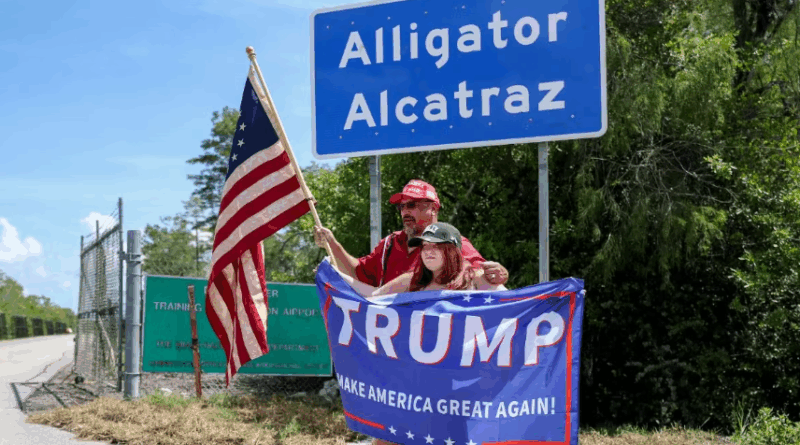Obama-Appointed Judge Shuts Down ‘Alligator Alcatraz’ Construction Over ‘Environmental Concerns’
An Obama-appointed federal judge has temporarily halted all new construction at Florida’s high-security immigrant detention facility, known as “Alligator Alcatraz,” in a ruling that critics say prioritizes political agendas over national security and border enforcement.
JUST IN: A federal judge has temporarily halted any further construction of the immigrant detention center known as “Alligator Alcatraz.” https://t.co/cH3QP1x48o pic.twitter.com/9IXwGhx66t
— ABC News (@ABC) August 7, 2025
U.S. District Judge Kathleen Mary Williams issued a temporary restraining order following complaints from environmental groups and the Miccosukee Tribe of Indians of Florida, who claim the site’s expansion threatens local wildlife and sacred tribal land. The order freezes construction activity for 14 days while the court considers whether federally mandated environmental impact studies were bypassed in the process.
The move immediately drew backlash from state officials and immigration enforcement advocates, who argue that the order interferes with a critical component of Florida’s partnership with federal authorities to detain and remove illegal immigrants.
Florida Attorney General James Uthmeier blasted the decision, stating: “Judge Williams’ order is wrong, and we will fight it. However, it does not shut down Alligator Alcatraz, which will continue to send illegal aliens back to where they came from.”
The facility itself remains fully operational. The ruling only blocks new construction or expansion of the prison complex — a fact the state was quick to emphasize. But opponents of the detention center have seized the ruling as a symbolic win in their larger campaign to shut it down entirely.
“This is not just about the environment,” one state official said. “It’s about left-wing judges and activist groups trying to stop red states from enforcing immigration laws and keeping dangerous illegal immigrants off the streets.”
The complaint claims that the state began construction without conducting environmental studies required under the National Environmental Policy Act (NEPA), which mandates thorough assessments of any project that could affect federal lands or endangered species. The Miccosukee Tribe alleges the site infringes on culturally sacred areas near the Everglades, and environmentalists cite concerns for wildlife including the endangered Florida panther.
But Florida’s legal team argues that since the state built and operates the facility — even if it’s partially funded by the federal government — it is not bound by NEPA requirements. Legal experts say the battle may hinge on how much operational control the federal government exerts over the site.
Regardless, the facility — which has become a cornerstone of Florida’s immigration crackdown — will continue to house illegal immigrants and operate at current capacity. Any attempt to expand or modify it, however, is now paused.
The “Alligator Alcatraz” nickname comes from the prison’s remote location deep in the Everglades, surrounded by swampy terrain teeming with alligators — a symbolic reflection of Florida’s hardened stance on illegal immigration. The site has been hailed by conservatives as a model for state-level enforcement in the Biden-to-Trump policy transition era.
Uthmeier vowed that Florida would not back down: “We are confident the courts will ultimately allow us to continue doing what Washington has failed to do — secure our communities and enforce the law.”
The next hearing on the matter is expected later this month, setting up another clash between the DeSantis-aligned state government and the federal judiciary over immigration enforcement, environmental red tape, and state sovereignty.



